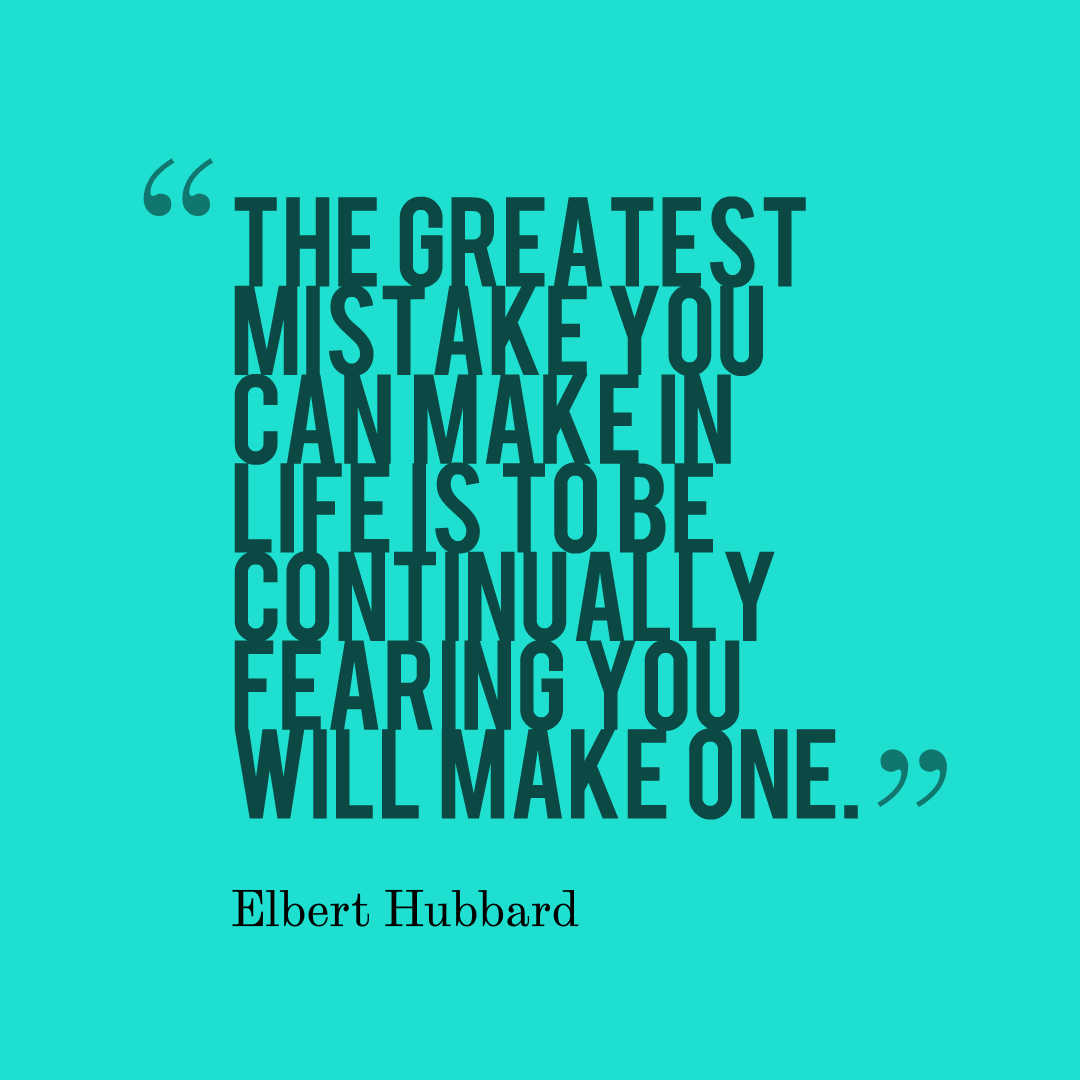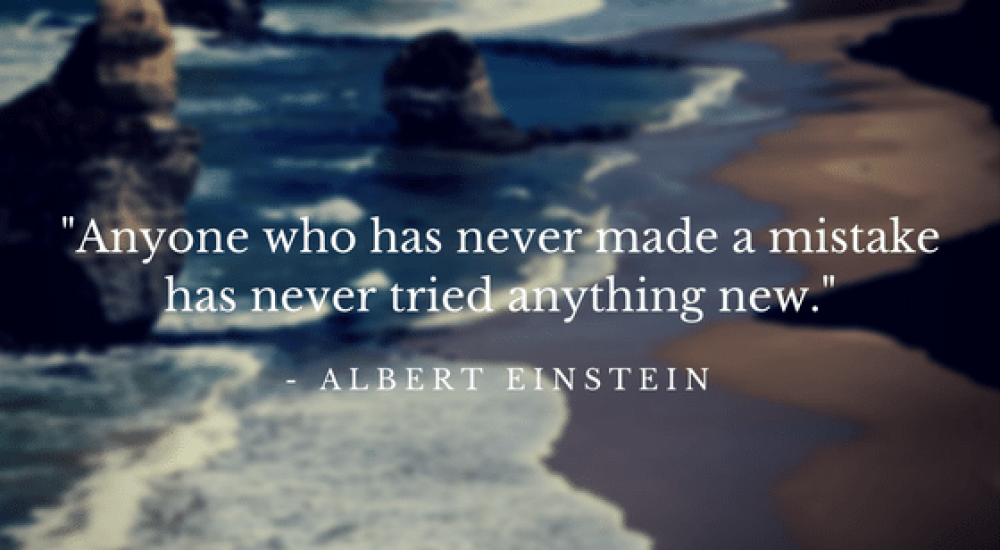Mistakes have gotten a bad rap.
Reactions to mistakes can range from mild embarrassment to communications of regret to utter outrage. If we always respond to mistakes negatively it has potential to give our kids the impression that mistakes are to be avoided at all costs.
I am a card-carrying member of the mistakes club. Some days I think about running for president of the mistake club. While I’ve certainly made mistakes I would rather have not, I appreciate the power of mistakes. I knew I was not alone in my thinking about mistakes when I Googled “Mistake Quotes.” There were over 10 pages of links. Goodreads had 715 quotes about mistakes…could that be a mistake?
Some of the quotes that stood out as I scanned the pages were:
• “Anyone who has never made a mistake has never tried anything new.”
– Albert Einstein
• “Freedom is not worth having if it does not include the freedom to make mistakes.”
– Mahatma Gandhi
• “We learn from failure, not from success!”
– Bram Stoker, Dracula
• “The greatest mistake you can make in life is to be continually fearing you will make one.”
– Elbert Hubbard
 Additionally, I’ve noticed that many of my Professional Learning conversations with after-school leaders have included rich discussions around the importance of kids being able to make mistakes and feel okay about it. This is also a frequent topic I share with my own children.
Additionally, I’ve noticed that many of my Professional Learning conversations with after-school leaders have included rich discussions around the importance of kids being able to make mistakes and feel okay about it. This is also a frequent topic I share with my own children.
When kids are taught to avoid mistakes, or worse, are not given the opportunity to make mistakes and learn from them they are denied a great deal of learning. It’s not surprising that children are taught not to make mistakes. We don’t embrace mistakes as adults. I lose sleep over the mistakes I make. When I am talking to after school leaders about working with kids and giving them opportunities to get out of the box and solve problems…I often use the example, “Someone didn’t wake up one morning and invent a cure for cancer. Solutions to problems take time and learning from mistakes and trying again. In fact, it often takes many people sharing their mistakes to arrive at the right answer.” I also share what a scientist once said to me. She said, “Science is about making mistakes and kids need to be comfortable with this to succeed.” When I share this with after-school leaders a light bulb often goes off.
Join (and Start) a Mistakes Club
At the conclusion of a recent training I led on good teaching practices I asked folks what they were taking from our time together and one young man said, “I am going to go back to my site and start a Mistakes Club!” He got a round of applause and I felt like I had reached my goal that day. This was after a day focused not on making mistakes, but on good teaching.
If you’re ready to start a Mistakes Club of your own, GREAT! There’s no secret handshake (or a membership card—but you can create them). All you have to do is invite kids in and encourage them to view their mistakes as an opportunity to learn.
Ways to help you kids build their mistake muscle
1. Let. Them. Fail. (First Attempt In Learning) it’s easy to step in when you’re afraid a child is about to feel the sting of failure. Often we design experiences so that we can be sure the children will be successful. But if they are safe from bodily harm, it’s okay to let them fail and try again. Don’t focus on the mistake but the next step. Say, “How would you like to try that this time?” or “What else might you try? ?”
2. Celebrate mistakes. Instead of consoling kids or getting upset…treat the mistake as a normal or inevitable thing that happens to everyone. To err is human after all.
3. Make mistakes the call out for a next step. When a child makes a mistake, let it be the beginning or the process for getting it right. Prompt them by asking, “What did you learn from that? How can we change it?”
4. Support them in the discomfort-but don’t alleviate it. There’s a lot of research around the merits of productive struggle. When a child is frustrated or disappointed by an outcome, know that the struggle feeds directly into their future academic and personal success. Nudge them along with encouraging words like, “I know this doesn’t feel great, but how can me make it right?” “Let’s try!”
5. Work together. We all know more brains are better than one. Collaboration encourages kids to get help from others, builds community, teaches important social skills, and helps children learn there are many ways to approach a problem.
6. Give help with out giving the answer. You don’t have to know all the answers. Instead of telling kids how to arrive at the desired result, ask “How could you do that a different way?”
7. Make mistakes a part of the culture. When debriefing an activity, have kids share mistakes they made and what they learned from them. If mistakes are an accepted part of your culture, kids won’t be afraid to make them. You can even share some mistakes you have made.
Exercising Your Mistake Muscle
The best thing about these mistake exercises is that they work for adults too. I invite you to join the Mistakes Club. Give yourself some breathing room. Fail (or succeed) spectacularly, but take some risks, learn, and grow. Share your reflections on mistakes in the comments. We can have a virtual Mistakes Club meeting! Share ideas for changing your practice with your kids and in your own learning. You might also read these helpful articles from Edutopia and BrightHorizons about the importance of mistakes and failure.
I had Trader Joe’s Corn Flakes this morning and a banana for breakfast.
Author Profile: @megangreen
